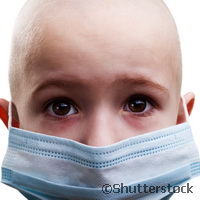Study finds young cancer patients affected by post-traumatic stress
Contrary to what some researchers believe, post-traumatic stress disorder impacts patients of all ages diagnosed with and treated for cancer. A study from the University of Zurich (UZH) and the University Children's Hospital Zurich in Switzerland found that post-traumatic stress disorder is triggered in infants and toddlers, not just adults or older children. The researchers suggest that experts should consider this while treating children, to prevent them from developing long-term psychological disorders. The finding was published in the Psycho-Oncology journal. Flashbacks and nightmares are what sufferers of post-traumatic stress disorder have when they relive their experiences. Young children also relive their experiences in traumatic play. As a result, they tend to avoid stimuli that remind them of what they experienced. They are also affected by vegetative hyperarousal like insomnia, and hypervigilance or concentration problems. For the purposes of this study, UZH doctoral student Anna Graf interviewed 48 mothers whose children were diagnosed with cancer. She found that 18.8 % of the young children and babies in the study showed the full clinical signs of preschool post-traumatic stress disorder. Another 41.7 % showed some symptoms, including anxiety and flashbacks. Ms Graf, under the supervision of UZH's Professor Markus Landolt and with the support of Dr Eva Bergsträsser from the University Children's Hospital Zurich, observed that there was a higher risk of children over the age of 18 months developing a disorder than younger children. She also found that post-traumatic stress disorder in the mother increased the probability of a disorder in the child. No correlation was observed between the development of post-traumatic stress disorder and the disease characteristics examined. 'The results of our study show that cancer and its treatment can also have a traumatic impact in babyhood and infancy,' said Professor Landolt. 'More care should be taken to ensure that potentially stressful procedures, such as bone marrow aspiration, are carried out as child-friendly and painlessly as possible.' The researchers believe heightening a child's sense of security both in hospital and during treatment can lessen the patient's anxiety. They recommend that personnel be trained specifically for childhood ages and that suitable infrastructure be established for children. Parents should also have access to psychological support, mostly because they are their children's closest resource during illness. In this study, the researchers observed that the most common medical diagnoses were solid tumours, leukaemia, lymphomas and brain tumours. In total, 85 % of the children had received chemotherapy, 56 % had been operated on, almost 17 % had been treated with radiotherapy and 12.5 % had received a bone marrow transplantation.For more information, please visit: University of Zurich (UZH): http://www.uzh.ch/index_en.html(opens in new window) Psycho-Oncology: http://onlinelibrary.wiley.com/journal/10.1002/(ISSN)1099-1611(opens in new window)
Countries
Switzerland



